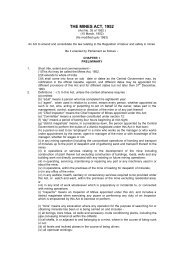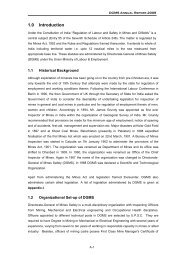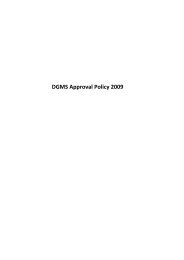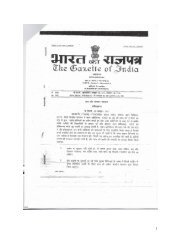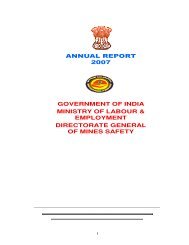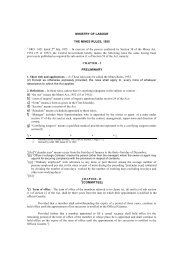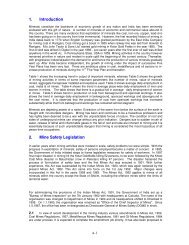India - Constitution - Directorate General of Mines Safety
India - Constitution - Directorate General of Mines Safety
India - Constitution - Directorate General of Mines Safety
You also want an ePaper? Increase the reach of your titles
YUMPU automatically turns print PDFs into web optimized ePapers that Google loves.
(1) Parliament has exclusive power to make any law withrespect to any matter not enumerated in the Concurrent List orState List.(2) Such power shall include the power <strong>of</strong> making any lawimposing a tax not mentioned in either <strong>of</strong> those Lists.Article 249 Power <strong>of</strong> Parliament to legislate with respect to amatter in the State List in the National interest(1) Notwithstanding anything in the foregoing provisions <strong>of</strong> thisChapter, if the Council <strong>of</strong> States has declared by resolutionsupported by not less than two-thirds <strong>of</strong> the members presentand voting that it is necessary or expedient in the nationalinterest that Parliament should make laws with respect to anymatter enumerated in the State List specified in the resolution,it shall be lawful for Parliament to make laws for the whole orany part <strong>of</strong> the territory <strong>of</strong> <strong>India</strong> with respect to that matter whilethe resolution remains in force.(2) A resolution passed under clause (1) shall remain in forcefor such period not exceeding one year as may be specifiedtherein:Provided that, if and so <strong>of</strong>ten as a resolution approving thecontinuance in force <strong>of</strong> any such resolution is passed in themanner provided in clause (1), such resolution shall continue inforce for a further period <strong>of</strong> one year from the date on whichunder this clause it would otherwise have ceased to be in force.(3) A law made by Parliament which Parliament would not butfor the passing <strong>of</strong> a resolution under clause (1) have beencompetent to make shall, to the extent <strong>of</strong> the incompetency,cease to have effect on the expiration <strong>of</strong> a period <strong>of</strong> six monthsafter the resolution has ceased to be in force, except asrespects things done or omitted to be done before theexpiration <strong>of</strong> the said period.Article 250 Power <strong>of</strong> Parliament to legislate with respect to anymatter in the State List if a Proclamation <strong>of</strong> Emergency is inoperation(1) Notwithstanding anything in this Chapter, Parliament shall,while a Proclamation <strong>of</strong> Emergency is in operation, have powerto make laws for the whole or any part <strong>of</strong> the territory <strong>of</strong> <strong>India</strong>with respect to any <strong>of</strong> the matters enumerated in the State List.(2) A law made by Parliament which Parliament would not butfor the issue <strong>of</strong> a Proclamation <strong>of</strong> Emergency have beencompetent to make shall, to the extent <strong>of</strong> the incompetency,cease to have effect on the expiration <strong>of</strong> a period <strong>of</strong> six monthsafter the Proclamation has ceased to operate, except asrespects things done or omitted to be done before theexpiration <strong>of</strong> the said period.Article 251 Inconsistency between laws made by Parliamentunder articles 249 and 250 and laws made by the legislatures<strong>of</strong> StatesNothing in articles 249 and 250 shall restrict the power <strong>of</strong> theLegislature <strong>of</strong> a State to make any law which under this<strong>Constitution</strong> it has power to make, but if any provision <strong>of</strong> a lawmade by the Legislature <strong>of</strong> a State is repugnant to anyprovision <strong>of</strong> a law made by Parliament which Parliament has





